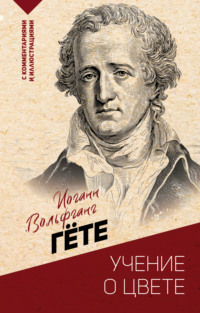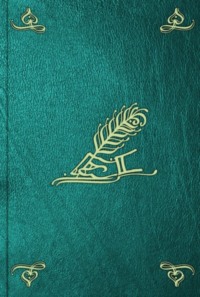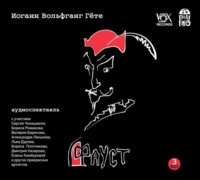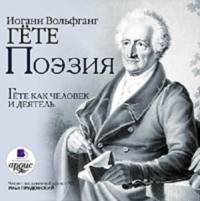 полная версия
полная версияAutobiography: Truth and Fiction Relating to My Life
Goethe left Frankfort in the spring of 1772 for Wetzlar, a quiet country town on the Lahn, one of the seats of government of the Holy Roman Empire. The emperors lived at Vienna; they were crowned at Frankfort; they held their parliaments at Ratisbon, and at Wetzlar their courts of justice. It was the custom for young lawyers to attend the sittings of these courts for a certain time before they could be admitted to practice on their own account. The company of these students, of the embassies from the component parts of the empire, and of various imperial officials, made the society a pleasant and lively one. Goethe soon found friends. His favorite house was occupied by one of the officials of the order, by name Buff, an honest man with a large family of children. The second daughter, Lotte, blue-eyed, fair and just twenty years of age, was first met by Goethe, shortly after his arrival, at a ball at Wolpertshausen. She strongly attracted him; he became a constant visitor at the house. He found that Lotte was a second mother to her brothers and sisters. Lotte, was really, though not formally, engaged to Kestner, a man of two-and-thirty, secretary to the Hanoverian legation. The discovery of this relation made no difference to Goethe; he remained the devoted friend to both. But the position was too critical to last. On September 10 they met in the German house for the last time. Goethe and Schlosser went together to Wetzlar in November. Here he heard of the death of Jerusalem, a young man attached to the Brunswick legation. He had been with Goethe at the University of Leipsic. Of a moody temperament, disheartened by failure in his profession, and soured by a hopeless passion for the wife of another, he had borrowed a pair of pistols under pretense of a journey, and had shot himself on the night of October 29.
Goethe immediately afterwards began his Werther. Goethe tells us that it was written in four weeks. In October it spread over the whole of Germany. It was enthusiastically beloved or sternly condemned. It was printed, imitated, translated into every language of Europe. Götz and Werther formed the solid foundation of Goethe's fame. It is difficult to imagine that the same man can have produced both works, so different are they in matter and style. Götz was the first manly appeal to the chivalry of German spirit, which, caught up by other voices, sounded throughout the Fatherland like the call of a warder's trumpet, till it produced a national courage, founded on the recollection of an illustrious past, which overthrew the might of the conqueror at the moment when he seemed about to dominate the world. Werther, as soft and melodious as Plato, was the first revelation to the world of that marvelous style which, in the hands of a master, compels a language which is as rich as Greek to be also as musical.
The spring of 1773, which witnessed the publication of Götz, saw him actively employed as an advocate. In November, Goethe's sister Cornelia was married to Schlosser and left Strasburg. Goethe felt the loss deeply. She lived but a short time. Her married life was tortured with suffering, and she died in 1777.
The summer of 1774 was spent in a journey to the Rhine. Goethe returned to Frankfort at the beginning of August. On December 11, Goethe was surprised by the visit of a stranger. It was Karl Ludwig von Knebel, who was traveling with the two princes of Saxe-Weimar, the reigning duke, Karl August, then just seventeen, and his younger brother, Constantine. This meeting decided the future course of Goethe's life.
He now came under the influence of Lili Schönemann, the daughter of a rich banker. This passion seemed to be of a more lasting nature than the others.
Neither family approved of the engagement between the youthful couple.
Goethe tore himself away, and went for a tour in Switzerland.
He returned to Frankfort on July 20. August was spent delightfully with Lili at Offenbach; his letters speak of nothing but her. He wrote some scenes in Faust – the walk in the garden, the first conversation with Mephistopheles, the interview with the scholar, the scene in Auerbach's cellar. Egmont was also begun under the stimulus of the American Rebellion. A way of escaping from his embarrassments was unexpectedly opened to him. The duke of Weimar passed through Frankfort both before and after his marriage, which took place on October 3. He invited Goethe to stay at Weimar. It was not for his happiness or for Lili's that they should have married. She afterwards thanked him deeply for the firmness with which he overcame a temptation to which she would have yielded.
At this time the smaller German courts were beginning to take an interest in German literature. Before the Seven Years' War the whole of German culture had been French. Even now German writers found but scant acceptance at Berlin or Vienna. The princes of the smaller states surrounded themselves with literature and art. The duke of Brunswick had made Lessing his librarian. The duke of Würtemberg paid special attention to education; he promoted the views of Schubart, and founded the school in which Schiller was educated. Hanover offered a home to Zimmermann, and encouraged the development of Schlegel. Darmstadt was especially fortunate. Caroline, the wife of the landgrave, had surrounded herself with a literary circle, of which Merck was the moving spirit. She had collected and privately printed the odes of Klopstock, and her death in 1774 seemed to leave Darmstadt a desert. Her daughter, Louisa, seemed to have inherited something of her mother's qualities. She married, on October 3,1775, the young duke of Weimar, who was just of age. She was of the house of Brunswick, and after two years of marriage had been left a widow at nineteen, with two sons. She committed their education to Count Görz, a prominent character in the history of the time. She afterwards summoned Wieland to instruct the elder, and Knebel to instruct the younger.
Upon this society Goethe rose like a star. From the moment of his arrival he became the inseparable companion of the grand-duke. The first months at Weimar were spent in a wild round of pleasure. Goethe was treated as a guest. In the autumn, journeys, rides, shooting parties; in the winter, balls, masquerades, skating parties by torch-light, dancing at peasants' feasts, filled up their time. Evil reports flew about Germany. We may believe that no decencies were disregarded except the artificial restrictions of courtly etiquette. In the spring he had to decide whether he would go or stay. In April the duke gave him the little garden by the side of the Ilm. In June he invested him with the title, so important to Germans, of /Geheimlegationsrath/, with a seat and voice in the privy council and an income.
Goethe's life was at no time complete without the influence of a noble- hearted woman. This he found in Charlotte von Stein, a lady of the court, wife of the master of the horse.
The close of 1779 was occupied by a winter journey to Switzerland. Two days were spent at Frankfort with Goethe's parents. Sesenheim was visited, and left with satisfaction and contentment. At Strasburg they found as to Lessing. The repertoire of the Weimar theater was stocked with pieces of solid merit, which long held their place. In August, 1792, he accompanied the duke to the campaign in the Ardennes. In 1793 he went with his master to the siege of Mainz. Goethe took the old German epic of Reynard the Fox, with which he had long been familiar, and which, under the guise of animals, represents the conflicting passions of men, and rewrote it.
Thus far he had produced but little since his return from Italy. His friendship with Schiller was now to begin, an alliance which, in the closeness of its intimacy and its deep effect on the character of both friends, has scarcely a parallel in literary history. If Schiller was not at this time at the height of his reputation, he had written many of the works which have made his name famous. He was ten years younger than Goethe. The Räuber plays the same part in his literary history as Götz plays in that of Goethe. This had been followed by Fiesco and Kabale und Liebe. In 1787 he settled at Weimar. The first effect of Schiller's influence on Goethe was the completion of Wilhelm Meister's Apprenticeship. It stands in the first rank of Goethe's writings. A more solid result of the friendship between the poets was the production of Hermann und Dorothea.
The latter half of 1798 was occupied with a tour in Switzerland. Before its commencement he visited his mother at Frankfort for the last time, and presented to her his wife and his son. In the beginning of 1805 Goethe was convinced that either he or Schiller would die in that year. In January they were both seized with illness. Schiller was the first to recover, and, visiting Goethe in his sick room, fell on his neck and kissed him with intense emotion. On April 29 they saw each other for the last time. Schiller was on his way to the theater, whither Goethe was too ill to accompany him. They parted at the door of Schiller's house. Schiller died on the evening of the 9th of May. No one dared to tell Goethe the sad news, but he saw on the faces of those who surrounded him that Schiller must be very ill. On the morrow of Schiller's death, when his wife entered his room, he said, "Is it not true that Schiller was very ill yesterday?" She began to sob. He then cried, "He is dead!" "Thou hast spoken it thyself," she answered. Goethe turned aside and covered his weeping eyes with his hands. Since that time Schiller and Goethe have been inseparable in the minds of their countrymen.
On October 14, 1806, the battle of Jena was fought. The court had fled from Weimar. On the 15th Napoleon and Goethe met. It was at the congress of Erfurt, where the sovereigns and princes of Europe were assembled. Goethe's presence was commanded by the duke. He was invited to an audience on October 2. The emperor sat at a large round table eating his breakfast. He beckoned Goethe to approach him. He asked how old he was, expressed his wonder at the freshness of his appearance, said that he had read Werther through seven times, and made some acute remarks on the management of the plot. Then, after an interruption, he said that tragedy ought to be the school of kings and peoples; that there was no subject worthier of treatment than the death of Caesar, which Voltaire had treated insufficiently. A great poet would have given prominence to Caesar's plans for the regeneration of the world, and shown what a loss mankind had suffered by his murder.
The idea of writing Faust seems to have come to Goethe in his earliest manhood. He was brooding over it at the same time with Götz von Berlichingen. Faust justly stands at the head of all Goethe's works. Founded on a well-known popular tale, indebted for its interest and pathos to incidents of universal experience, it deals with the deepest problems which can engage the mind of man.
In 1809 he finished The Elective Affinities.
It was natural at the beginning of a new course of life that Goethe should write an account of his past existence. The study of his collected poems made it apparent to him how necessary it was to furnish a key by which they might be understood. These various causes led to the composition of /Dichtung und Wahrheit/ (Poetry and Truth), an autobiographical history of the poet's life from his birth till his settlement at Weimar. This work is the cause of much embarrassment to the poet's biographers. Where it ought to be the most trustworthy source of information, it is most misleading.
Once more in his old age Goethe came under the sovereignty of a woman. She was Marianne von Willemer, the newly married wife of a Frankfort banker. Goethe made her acquaintance in a journey which he took in the Rhine country. The correspondence between Goethe and Marianne was published in 1877. It extends almost to the day of his death, and includes letters from Eckermann giving an account of his last moments.
The last twelve years of Goethe's life, when he had passed his seventieth birthday, were occupied by his criticisms on the literature of foreign countries, by the Wanderjahre, and the second part of Faust. He was the literary dictator of Germany and of Europe. The Wanderjahre contains some of Goethe's most beautiful conceptions, The Flight Into Egypt, The Description of the Pedagogic Province, The Parable of the Three Reverences.
The second part of Faust has been a battlefield of controversy since its publication, and demands fuller attention. Its fate may be compared with that of the latest works of Beethoven. For a long time it was regarded as impossible to understand, and as not worth understanding, the production of a great artist whose faculties had been impaired by age. By degrees it has, by careful labor, become intelligible to us, and the conviction is growing that it is the deepest and most important work of the author's life.
He had much to darken his latter days. His wife had died in 1816. He felt her loss bitterly. The Duchess Amalia had died eight years before. He had now to undergo bitterer experiences when he was less able to bear them. Frau von Stein, with whom he had renewed his friendship, if not his love, died in January, 1827; and in June, 1828, he lost the companion of his youth, the Grand Duke Karl August, who died suddenly, away from Weimar.
We must pass to the closing scenes. On Thursday, March 15, 1832, he spent his last cheerful and happy day. He awoke the next morning with a chill. From this he gradually recovered, and on Monday was so much better that he designed to begin his regular work on the next day. But in the middle of the night he woke with a deathly coldness, which extended from his hands over his body, and which took many hours to subdue. It then appeared that the lungs were attacked, and that there was no hope of his recovery. Goethe did not anticipate death. He sat fully clothed in his arm chair, made attempts to reach his study, spoke confidently of his recovery, and of the walks he would take in the fine April days. His daughter-in-law Ottilie tended him faithfully. On the morning of the 22d his strength gradually left him. He sat slumbering in his arm chair, holding Ottilie's hand. Her name was constantly on his lips. His mind occasionally wandered, at one time to his beloved Schiller, at another to a fair female head with black curls, some passion of his youth. His last words were an order to his servant to open the second shutter to let in more light. After this he traced with his forefinger letters in the air. At half-past eleven in the day he drew himself, without any sign of pain, into the left corner of his arm chair, and went so peacefully to sleep that it was long before the watchers knew that his spirit was really gone. He is buried in the grand-ducal vault, where the bones of Schiller are also laid.
AUTOBIOGRAPHY TRUTH AND FICTION RELATING TO MY LIFE
AUTHOR'S PREFACE
As a preface to the present work, which, perhaps, more than another, requires one, I adduce the letter of a friend, by which so serious an undertaking was occasioned.
"We have now, my dear friend, collected the twelve parts of your poetical works, and, on reading them through, find much that is known, much that is unknown; while much that had been forgotten is revived by this collection. These twelve volumes standing before us in uniform appearance, we cannot refrain from regarding as a whole; and one would like to sketch therefrom some image of the author and his talents. But it cannot be denied, considering the vigor with which he began his literary career, and the length of time which has since elapsed, that a dozen small volumes must appear incommensurate. Nor can one forget, that, with respect to the detached pieces, they have mostly been called forth by special occasions, and reflect particular external objects, as well as distinct grades of inward culture; while it is equally clear, that temporary moral and æsthetic maxims and convictions prevail in them. As a whole, however, these productions remain without connection; nay, it is often difficult to believe that they emanate from one and the same writer.
"Your friends, in the mean time, have not relinquished the inquiry, and try, as they become more closely acquainted with your mode of life and thought, to guess many a riddle, to solve many a problem; indeed, with the assistance of an old liking, and a connection of many years' standing, they find a charm even in the difficulties which present themselves. Yet a little assistance here and there would not be unacceptable, and you cannot well refuse this to our friendly entreaties.
"The first thing, then, we require, is that your poetical works, arranged in the late edition according to some internal relations, may be presented by you in chronological order, and that the states of life and feeling which afforded the examples that influenced you, and the theoretical principles by which you were governed, may be imparted in some kind of connection. Bestow this labor for the gratification of a limited circle, and perhaps it may give rise to something that will be entertaining and useful to an extensive one. The author, to the most advanced period of his life, should not relinquish the advantage of communicating, even at a distance, with those whom affection binds to him; and if it is not granted to every one to step forth anew, at a certain age, with surprising and powerful productions, yet just at that period of life, when knowledge is most perfect, and consciousness most distinct, it must be a very agreeable and re-animating task to treat former creations as new matter, and work them up into a kind of Last Part, which may serve once more for the edification of those who have been previously edified with and by the artist."
This desire, so kindly expressed, immediately awakened within me an inclination to comply with it: for if, in the early years of life, our passions lead us to follow our own course, and, in order not to swerve from it, we impatiently repel the demands of others; so, in our later days, it becomes highly advantageous to us, should any sympathy excite and determine us, cordially, to new activity. I therefore instantly undertook the preparatory labor of separating the poems, both great and small, of my twelve volumes, and of arranging them according to years. I strove to recall the times and circumstances under which each had been produced. But the task soon grew more difficult, as full explanatory notes and illustrations were necessary to fill up the chasms between those which had already been given to the world. For, in the first place, all on which I had originally exercised myself were wanting, many that had been begun and not finished were also wanting, and of many that were finished even the external form had completely disappeared, having since been entirely reworked and cast into a different shape. Besides, I had also to call to mind how I had labored in the sciences and other arts, and what, in such apparently foreign departments, both individually and in conjunction with friends, I had practised in silence, or had laid before the public.
All this I wished to introduce by degrees for the satisfaction of my well-wishers, but my efforts and reflections always led me farther on; since while I was anxious to comply with that very considerate request, and labored to set forth in succession my internal emotions, external influences, and the steps which, theoretically and practically, I had trod, I was carried out of my narrow private sphere into the wide world. The images of a hundred important men, who either directly or indirectly had influenced me, presented themselves to my view; and even the prodigious movements of the great political world, which had operated most extensively upon me, as well as upon the whole mass of my contemporaries, had to be particularly considered. For this seems to be the main object of biography, – to exhibit the man in relation to the features of his time, and to show to what extent they have opposed or favored his progress; what view of mankind and the world he has formed from them, and how far he himself, if an artist, poet, or author, may externally reflect them. But for this is required what is scarcely attainable; namely, that the individual should know himself and his age, – himself, so far as he has remained the same under all circumstances; his age, as that which carries along with it, determines and fashions, both the willing and the unwilling: so that one may venture to pronounce, that any person born ten years earlier or later would have been quite a different being, both as regards his own culture and his influence on others.
In this manner, from such reflections and endeavors, from such recollections and considerations, arose the present delineation; and from this point of view, as to its origin, will it be the best enjoyed and used, and most impartially estimated. For any thing further it may be needful to say, particularly with respect to the half-poetical, half- historic, mode of treatment, an opportunity will, no doubt, frequently occur in the course of the narrative.
PART THE FIRST
FIRST BOOK
On the 28th of August, 1749, at mid-day, as the clock struck twelve, I came into the world, at Frankfort-on-the-Main. My horoscope was propitious: the sun stood in the sign of the Virgin, and had culminated for the day; Jupiter and Venus looked on him with a friendly eye, and Mercury not adversely; while Saturn and Mars kept themselves indifferent; the moon alone, just full, exerted the power of her reflection all the more, as she had then reached her planetary hour. She opposed herself, therefore, to my birth, which could not be accomplished until this hour was passed.
These good aspects, which the astrologers managed subsequently to reckon very auspicious for me, may have been the causes of my preservation; for, through the unskilfulness of the midwife, I came into the world as dead; and only after various efforts was I enabled to see the light. This event, which had put our household into sore straits, turned to the advantage of my fellow-citizens, inasmuch as my grandfather, the /Schultheiss/2,John Wolfgang Textor, took occasion from it to have an /accoucheur/ appointed, and to introduce, or revive, the tuition of midwives, which may have done some good to those who were born after me.
When we desire to recall what happened to us in the earliest period of youth, it often happens that we confound what we have heard from others with that which we really possess from our own direct experience. Without, therefore, instituting a very close investigation into the point, which, after all, could lead to nothing, I am conscious that we lived in an old house, which, in fact, consisted of two adjoining houses, that had been opened into each other. A winding staircase led to rooms on different levels, and the unevenness of the stories was remedied by steps. For us children, – a younger sister and myself, – the favorite resort was a spacious floor below, near the door of which was a large wooden lattice that allowed us direct communication with the street and open air. A bird-cage of this sort, with which many houses were provided, was called a frame (/Geräms/). The women sat in it to sew and knit; the cook picked her salad there; female neighbors chatted with each other; and the streets consequently, in the fine season, wore a southern aspect. One felt at ease while in communication with the public. We children, too, by means of these frames, were brought into contact with our neighbors, of whom three brothers Von Ochsenstein, the surviving sons of the deceased /Schultheiss/, living on the other side of the way, won my love, and occupied and diverted themselves with me in many ways.
Our family liked to tell of all sorts of waggeries to which I was enticed by these otherwise grave and solitary men. Let one of these pranks suffice for all. A crockery-fair had just been held, from which not only our kitchen had been supplied for a while with articles for a long time to come, but a great deal of small gear of the same ware had been purchased as playthings for us children. One fine afternoon, when every thing was quiet in the house, I whiled away the time with my pots and dishes in the frame, and, finding that nothing more was to be got out of them, hurled one of them into the street. The Von Ochsensteins, who saw me so delighted at the fine smash it made, that I clapped my hands for joy, cried out, "Another." I was not long in flinging out a pot; and, as they made no end to their calls for more, by degrees the whole collection, platters, pipkins, mugs and all, were dashed upon the pavement. My neighbors continued to express their approbation, and I was highly delighted to give them pleasure. But my stock was exhausted; and still they shouted, "More." I ran, therefore, straight to the kitchen, and brought the earthenware, which produced a still livelier spectacle in breaking; and thus I kept running backwards and forwards, fetching one plate after another, as I could reach it from where they stood in rows on the shelf. But, as that did not satisfy my audience, I devoted all the ware that I could drag out to similar destruction. It was not till afterwards that any one appeared to hinder and forbid. The mischief was done; and, in place of so much broken crockery, there was at least a ludicrous story, in which the roguish authors took special delight to the end of their days.









